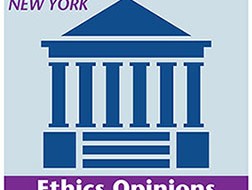Conflicts and Referral Fees
By Lazar Emanuel [Originally published in NYPRR November]
In Ethics Opinion 745, the NYSBA considered the issue of referrals to another lawyer by a lawyer who is disqualified from continuing a representation by virtue of a conflict of interest. The Opinion distinguished between “consentable” conflicts and “non-consentable” conflicts.
Under DR 2-107(A): the originating lawyer and the recipient lawyer may divide the fees in a matter on three conditions:
(1) The client consents to employment of another lawyer after a full disclosure that a division of fees will be made.
(2) The division is in proportion to the services performed by each lawyer or, by a writing given the client, each lawyer assumes joint responsibility for the representation.
(3) The total fee of the lawyers does not exceed reasonable compensation for all legal services they rendered the client. DR 2-107(A).
If a lawyer is disqualified from assuming sole responsibility for a matter by virtue of a non-consentable conflict of interest, it follows that the lawyer cannot share in the continuing services or assume joint responsibility for the representation. It also follows that the lawyer may not share in the fees for that matter after he refers it to the other lawyer.
The Opinion declined to define exactly what the term “joint responsibility” encompasses, but it did conclude that the term does require more than “financial accountability and malpractice insurance” by the referring lawyer.
What if the conflict of interest confronting the lawyer is one to which the client may consent but the lawyer decides that it’s in the client’s best interest to refer the matter to another lawyer instead of keeping it himself. An example would be a case in which a lawyer has an economic interest that may conflict with the economic interest of a client. DR 5-101(A) provides:
A lawyer shall not accept or continue employment if the exercise of professional judgment on behalf of the client will be or reasonably may be affected by the lawyer’s own financial, business, property, or personal interests, unless a disinterested lawyer would believe that the representation of the client will not be adversely affected thereby and the client consents to the representation after full disclosure of the implications of the lawyer ‘s interest.
Construing this provision, the Opinion advises that the referring lawyer with an economic conflict may properly receive a referral fee, provided he meets the other requirements of DR 2-107(A), supra.
The Opinion concludes: A disqualified lawyer cannot assume “joint responsibility” for a matter and therefore, may not be paid a referral fee, unless the referring lawyer obtains client consent under the same standard that would allow the lawyer to accept or continue “sole responsibility” for the matter.
Lazar Emanuel is the Publisher of NYPRR.
DISCLAIMER: This article provides general coverage of its subject area and is presented to the reader for informational purposes only with the understanding that the laws governing legal ethics and professional responsibility are always changing. The information in this article is not a substitute for legal advice and may not be suitable in a particular situation. Consult your attorney for legal advice. New York Legal Ethics Reporter provides this article with the understanding that neither New York Legal Ethics Reporter LLC, nor Frankfurt Kurnit Klein & Selz, nor Hofstra University, nor their representatives, nor any of the authors are engaged herein in rendering legal advice. New York Legal Ethics Reporter LLC, Frankfurt Kurnit Klein & Selz, Hofstra University, their representatives, and the authors shall not be liable for any damages resulting from any error, inaccuracy, or omission.
Related Posts
« Conflicts of Interest Under New DR 1-106 Durable Powers and Client’s Incapacity »







